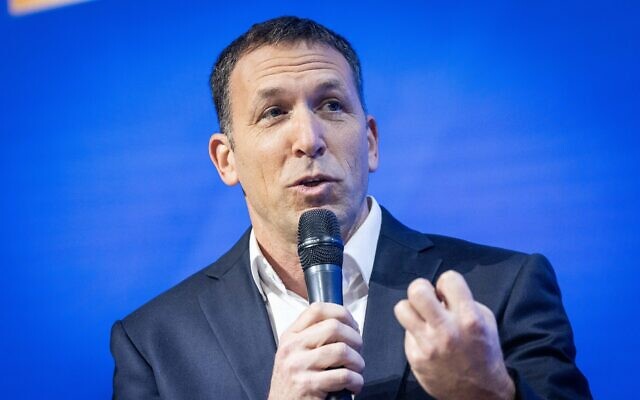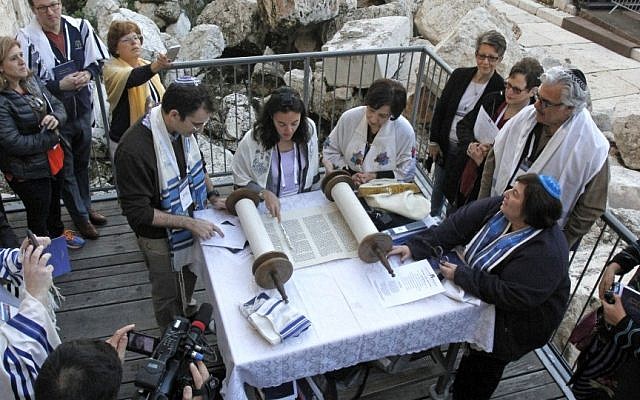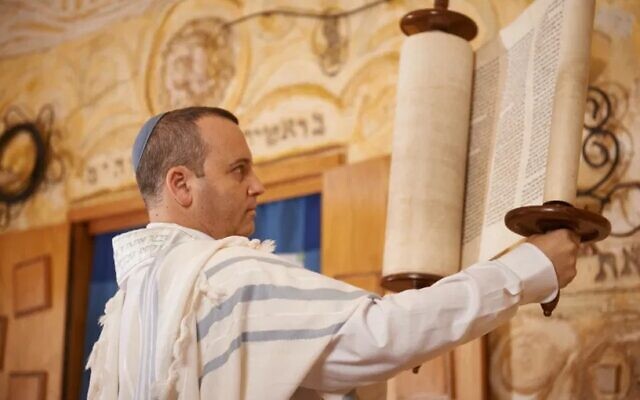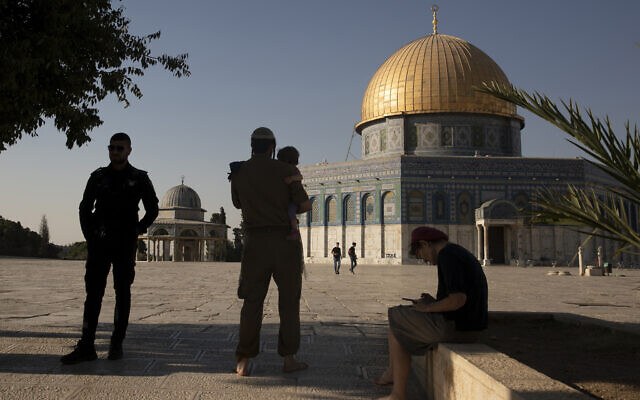Labor MK Gilad Kariv, a Reform rabbi, condemns Matan Kahana for claiming ‘the vast majority’ of Jews in Israel are Orthodox

Religious Affairs Minister Matan Kahana (Yamina) on Saturday appeared to walk back his support for the 2016 Western Wall compromise deal to build a permanent mixed-gender plaza for non-Orthodox prayer at the holy site.
“The vast majority of the Jews in Israel are Orthodox Jews and therefore I don’t think it’s right to give over control of parts of the Western Wall to streams that don’t represent the vast majority of Jews in Israel,” Kahana said in an interview with the Kan public broadcaster.
“I don’t necessarily support this framework,” he said of the 2016 proposal. “It must be studied, to see how we resolve the [religious] wars” surrounding the Western Wall.
“In the end, I think we must end the disagreements surrounding the Western Wall, without giving over control of any kind to denominations that represent a very small minority of Jews,” he added.
In an interview with The Times of Israel earlier this month, Kahana, an Orthodox minister who has advanced a series of far-reaching religious reforms on kashrut, endorsed the 2016 framework.
In 2016, former prime minister Benjamin Netanyahu’s government approved a compromise deal to create a permanent pluralistic prayer pavilion at the Western Wall after years of negotiations between Israel and Diaspora leaders. But a year later, the then-prime minister capitulated to pressure from his ultra-Orthodox coalition partners and indefinitely froze the deal.
Members of the current government led by Prime Minister Naftali Bennett have indicated that they are looking to revive the deal.

Kahana’s remarks were condemned by Labor MK Gilad Kariv, who is also a Reform rabbi.
“It emerges from Minister Matan Kahana’s remarks that he’s forgotten that the majority of Jews in Israel are not Orthodox, but rather secular or traditional, and the vast majority support the Western Wall framework and additional compromises on religion and state,” tweeted Kariv. “It’s time for the minister to stop operating in accordance with the incitement by the Haredi parties, and [Religious Zionism MKs] Smotrich and Ben Gvir, but rather in the spirit of the government and its guidelines.”
“The Western Wall plan is a compromise framework that earned the support of Prime Minister Bennett in the past and it should be implemented quickly,” added Kariv.

In August, Diaspora Affairs Minister Nachman Shai told The Times of Israel that reviving the agreement is on the cabinet’s agenda and enjoys wide backing in the coalition, including by Bennett.
The original plan includes three key provisions: a joint entrance to the main Western Wall plaza and the egalitarian prayer space; a new permanent pavilion greatly enlarging the existing modest prayer deck, which has served as a site for pluralistic prayer since 2000; and, perhaps most controversially, a joint council including representatives from liberal streams of Judaism and government officials that would be in charge of overseeing the site.
The small platform currently used for pluralistic prayer services is located in the Davidson Archaeological Park, tucked into an area called Robinson’s Arch. It is out of sight of the current mainstream Orthodox prayer plaza, separated from it by the ramp leading up to the Mughrabi Gate, which is the only entrance for non-Muslims to the Temple Mount.
In his interview to Kan, Kahana also voiced support for allowing Jewish prayer at the Temple Mount, adding that the government must act “wisely” given the sensitivities surrounding the flashpoint site.
“I think it’s right to allow Jews to pray on the Temple Mount. I think that at the end of the day, it’s the holiest site for Jews in the world. We need to see how we can get there, in a calculated way,” he said.

In recent months, Israel was reported to have quietly started allowing Jewish prayers on the Temple Mount, in what would appear to be a major change to the status quo that has existed at the holy site for decades.
The Temple Mount is the holiest place in Judaism, as the site of the biblical Temples. It is the site of the third-holiest shrine in Islam, the Al-Aqsa Mosque.
Israel captured the Temple Mount and Jerusalem’s Old City in the Six Day War and extended sovereignty throughout Jerusalem. Anxious to reduce friction with the Muslim world, however, and given that Orthodox sages generally counsel against ascending the Temple Mount for fear of treading on the sacred ground where the Temple’s Holy of Holies stood, Israel since 1967 allowed the Jordanian Waqf to continue to maintain religious authority atop the mount. Jews are allowed to visit under numerous restrictions, but not to pray.
As reported by The Times of Israel
